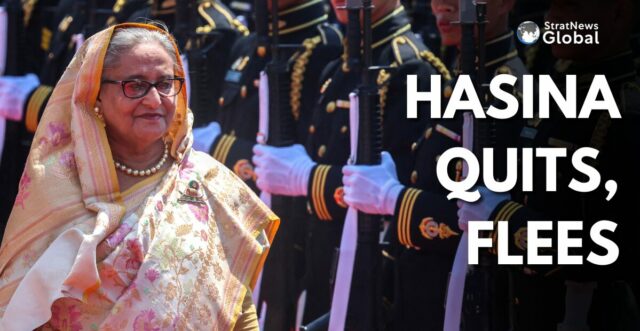Bangladesh Prime Minister Sheikh Hasina has resigned and left the country on Monday, according to media reports. This dramatic move comes amidst some of the worst violence since Bangladesh’s independence over five decades ago. The unrest has led to more than 106 fatalities since Sunday.
Public Reaction and Army’s Role
Tweets like “Bangladesh is free” are trending on X (formerly Twitter) following Sheikh Hasina’s resignation. This reflects significant public reaction, suggesting a sense of liberation or a new chapter for Bangladesh.
Statements from Bangladesh Army Chief
Bangladesh Army Chief General Waker Uz Zaman stated in a televised address that the army has taken over, and an interim government will be formed. He confirmed that Prime Minister Hasina, 76, had left the country. Media reports suggest she departed in a military helicopter with her sister, heading to either the eastern Indian state of West Bengal or India’s northeastern state of Tripura. Reuters could not immediately verify these reports.
Scenes of Jubilation and Chaos
Television visuals showed thousands of people pouring into the streets of the capital Dhaka, celebrating and shouting slogans. Many stormed Hasina’s official residence, Ganabhaban, displaying victory signs. Crowds were seen inside the residence, with some carrying away televisions, chairs, and tables from one of the most protected buildings in the country. Protesters in Dhaka climbed atop a large statue of independence leader Sheikh Mujibur Rahman, Hasina’s father, and began chiselling away at the head with an axe.
Recent Violence and Protests
The recent violence is among the most severe since Bangladesh gained independence in 1971. The unrest began last month when student groups demanded the scrapping of a controversial quota system in government jobs. This escalated into a campaign to seek Hasina’s ouster. On Monday, at least six people were killed in clashes between police and protesters in the Jatrabari and Dhaka Medical College areas, according to the Daily Star newspaper. About 150 people were killed in protests last month.
Political Instability
The resignation of a sitting Prime Minister amidst such turmoil is unprecedented in recent history. This development raises concerns about the country’s political stability and future governance. The political vacuum created by Hasina’s exit could lead to further instability and power struggles.
Future Implications
The departure of Sheikh Hasina marks a critical juncture in Bangladesh’s history. The nation’s future now hangs in the balance as it navigates this period of unprecedented political and social upheaval. The coming days will be crucial in determining the next steps for Bangladesh and its people.
International Reactions
The international community is closely monitoring the situation in Bangladesh. Countries with strong ties to Bangladesh, including neighbouring India and major global powers, are responding with concern. The stability of South Asia is of significant interest to many, and the unrest in Bangladesh could have broader regional implications.
With Inputs from Reuters
Research Associate at StratNewsGlobal, A keen observer of #China and Foreign Affairs. Writer, Weibo Trends, Analyst.
Twitter: @resham_sng





